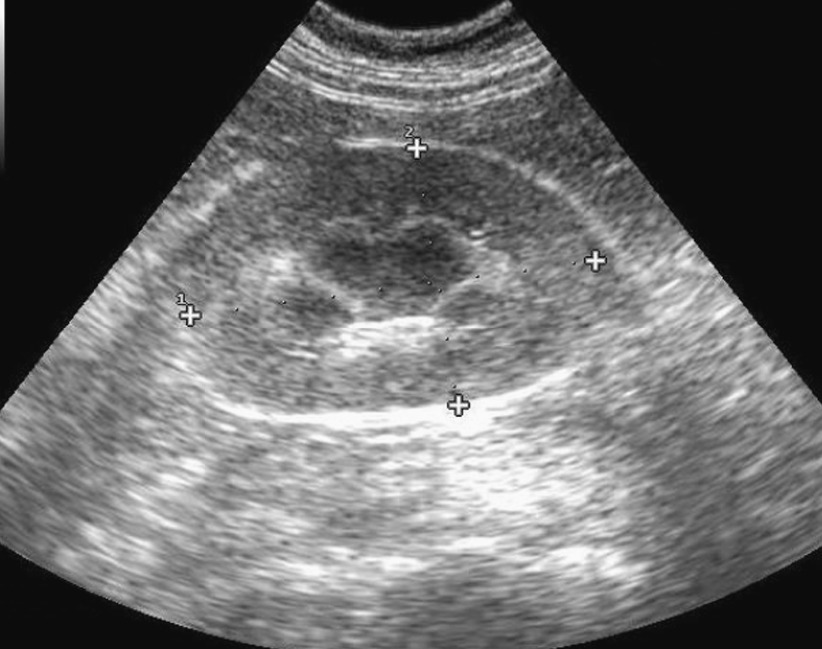Small Animal Emergency and Critical Care Medicine: Self-Assessment Color Review, Second Edition, Q&A 08
Jump to navigation
Jump to search
| This question was provided by CRC Press. See more case-based flashcards |

|
Student tip: This case is a well-illustrated example of an ultrasound scan. |
A 1.5-year-old male neutered cat presents for vomiting and inappetence of 2 days’ duration. Blood work done 2 months ago was normal. T = 36.7°C (98°F); HR = 180 bpm; RR = 20 bpm; CRT = 2 sec; MM gray, dry; palpable femoral pulses; perfusion – concern for early decompensatory shock; 6–8% dehydrated (dry MM, corneas). Both kidneys are enlarged and painful. Urinary bladder feels empty. CBC = neutrophilic left shift; BUN = 53.5 mmol/l (150 mg/dl); creatinine = 442 μmol/l (5.0 mg/dl); K+ = 6.5 mEq/l; PO4 = 1.3 mmol/l (4.0 mg/dl). Venous blood gas: pH = 7.32; HCO3 = 13 mEq/l; PvCO2 = 29 mmHg..
| Question | Answer | Article | |
| Provide three categories for initiating mechanisms of AKI in the cat or dog. List potential metabolic consequences. | (1) Pre-renal: decreased blood flow. (2) Renal: infectious or inflammatory, structural alterations, toxins. (3) Post-renal: obstruction or disruption to outflow tract. Metabolic complications include: metabolic acidosis, hyperkalemia, gastric ulceration, coagulopathy, neurologic signs, vomiting, diarrhea, changes in body fluid balance, and dysfunction of other organs.
|
Link to Article | |
| Abdominal ultrasound demonstrated moderately enlarged kidneys, with a thickened cortex and a bright corticomedullary line (50), no free abdominal fluid, and a small bladder. How does this information contribute to the diagnosis? | Bright corticomedullary rim sign can be seen in many normal cats and has also been associated with toxins (ethylene glycol), renal hypercalcemia (in dogs), and interstitial diseases.
|
Link to Article | |
| What additional diagnostics should be considered for this cat? | Include urinalysis, urine culture and susceptibility, ethylene glycol test, and FeLV/FIV testing. Leptospirosis titers if endemic area. A renal aspirate might identify juvenile lymphoma, interstitial nephritis, or FIP. Renal biopsies provide more definitive information. BP reflects renal blood flow and identifies hypertension.
|
Link to Article | |
| Describe initial treatment plans for this cat and outline how to monitor the fluid balance. | IV isotonic crystalloids to restore perfusion using low volume infusion techniques to normal end-points. The rehydration rate is then added to the maintenance fluids over 4 hours. Monitor urine output, body weight, temperature, BP with HR, RR and effort every 2–4 hours until stable. Recheck electrolytes, blood gases, creatinine, and phosphorus daily. CVP can reflect central volume and is important if oliguic, anuric, or polyuric.
|
Link to Article | |
| Name the mechanism of action of each of the following medications/techniques when utilized in a patient with AKI: (a) mannitol; (b) furosemide; (c) dialysis; (d) dopamine; (e) diltiazem; (f) fenoldopam. | (a) Osmotic diuretic. (b) Inhibits Na/2Cl/K cotransporter in ascending loop of Henle. (c) Diffusion of molecules across a semipermeable membrane. (d) In low doses in dogs will cause renal arteriolar dilation and increase GFR. (e) Scavenges endothelin, resulting in vasodilation. (f) A dopaminergic receptor partial agonist causing arteriolar vasodilation and diuresis in cats.
|
Link to Article | |
To purchase the full text with your 20% off discount, go to the CRC Press Veterinary website and use code VET18.
